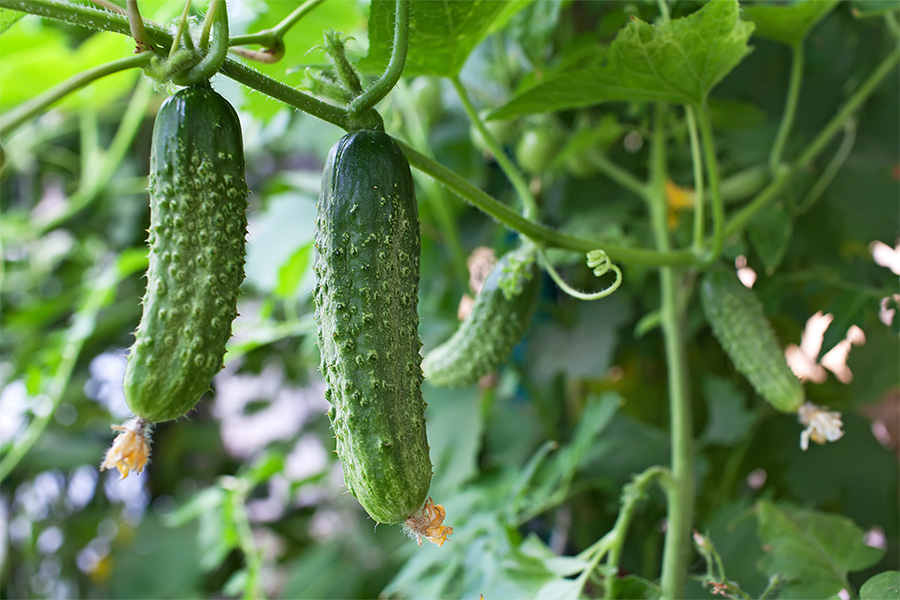Agriculture & Natural Resources

Testing Services
Now Available through Greene County Extension Office
- To know how much lime and fertilizer your soil needs for best growth of your lawn, garden, landscape, wildlife food plot, or other plants.
- Prevent from applying too much or not enough.
- Too much wastes your money and can damage the environment by running off into water
- Not enough can result in poor growth and leave soils bare to erode.
?

Expert Resources
-
 Cucumbers are one of the most popular crops in today’s home garden. This publication helps you to select the varieties to suit your needs.
Cucumbers are one of the most popular crops in today’s home garden. This publication helps you to select the varieties to suit your needs. -
Research has demonstrated that proper dry-off methods are vital in promoting udder health during the nonlactating period and at calving. For high producing cows, it may be necessary to decrease dietary energy over the last 1-2 weeks of lactation by increasing fiber and eliminating grain. Abrupt cessation of milking is probably as good as intermittent milking with a diet change for low and medium producing cows; however, intermittent milking is recommended for high producing cows to decrease milk yield and minimize leakage at dry-off, which could lead to mastitis. First lactation cows should be given a 50- to 60-day dry period, but multiparous animals fare well with a 35- to 45-day dry period. Selective dry cow therapy with non lactating cow antibiotics plus teat seal is as effective as blanket dry cow therapy with non lactating cow antibiotics plus teat seal for cows with SCC less than 200,000/ml. However, blanket dry therapy with both products is recommended for cows that dry off with greater than 200,000/ml. It is important to follow recommended infusion techniques to preserve the protective components of teat canal keratin and the sphincter muscle. And lastly, use of coliform vaccines will enhance immunity over the dry period and reduce clinical coliform mastitis in early lactation. This publication address these topics in more detail in order to help producers prevent mastitis in their dairy herds.
-
Prevalence of mastitis in dairy goats ranges between 5% and 30%, with Staphylococcus spp., otherwise known as the coagulase-negative staphylococci, identified as the most frequent cause of infection. These staphylococci produce persistent subclinical mastitis with markedly elevated somatic cell counts (SCC), which may lead to clinical symptoms. Prevention is the key to controlling staphylococcal mastitis in dairy goats, as once this disease becomes established, chronic inflammation of mammary tissues and elevated SCC will follow, resulting in reduced milk yield and quality. This publication discusses proper husbandry practices and sanitation methods that can be implemented by producers. The results of two vaccine trials as a potential means to control mastitis in ruminants are also presented and discussed. Vaccination should only be included as part of the whole herd approach to mastitis control. Any vaccination program must be carried out in conjunction with other proper management practices.

Master Gardener Extension Volunteers
DEADLINE FOR Applications EXTENDED TILL November 15, 2022
OUR PURPOSE
? As an educational and service organization, our primary purposes are:
- Extending Master Gardeners’ knowledge of and interest in gardening and related activities.
- Sharing ?information with Georgians about horticultural practices and techniques ?in accordance with the research and recommendations of the University of Georgia Cooperative Extension Service.
- Enhancing and supplementing the horticultural efforts of the University of Georgia Cooperative Extension Service.
- Providing opportunities for members to meet and associate with others who have similar horticultural interests.
EDUCATION & SERVICE
?We strive to promote knowledge, interest, appreciation, and enjoyment of ?gardening among members and the public through meetings, newsletters, ?grants, and activities. We also seek to provide the community with ?information about good gardening practices through news articles and ?other media, clinics, exhibits, and presentations to garden clubs, ?schools and other community groups.
MONTHLY Lunch and Learn Meetings
Join us on the third Thursday of every month at 11am at Nick's Place for a lunch and learn program in downtown Crawfordville.
